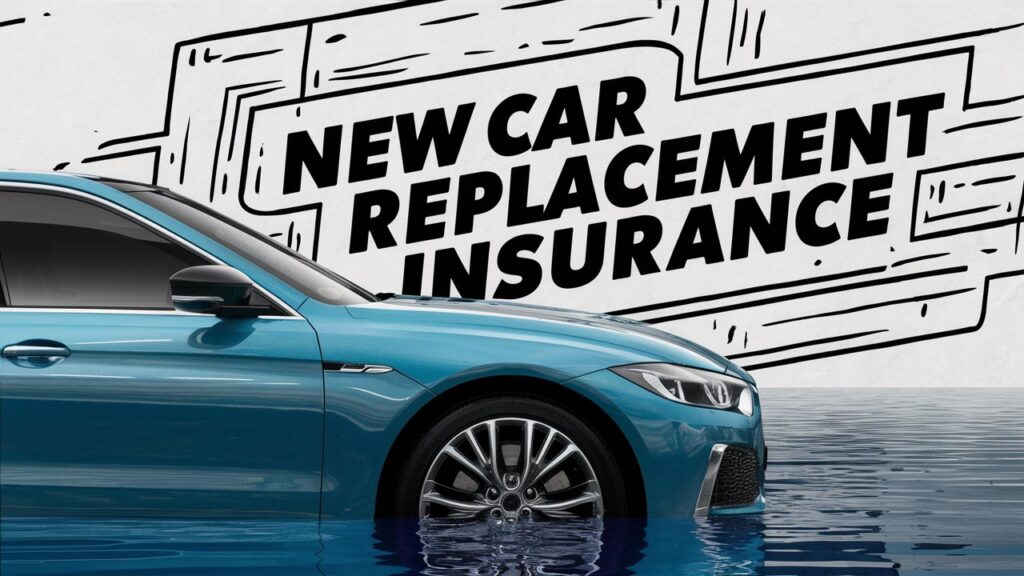Imagine driving your brand-new car off the lot, only to face an unexpected accident. With New Car Replacement Insurance, you won’t have to worry about financial loss. This specialized coverage ensures you’ll receive a new car of the same make and model if yours is totaled within the first year or two.
Purchasing a new car is an exhilarating experience, often marked by the new car smell, the pristine condition of the vehicle, and the promise of new adventures on the road. However, the unfortunate reality is that accidents can happen at any time, and the depreciation of your new vehicle begins the moment you drive it off the lot. This is where New Car Replacement Insurance steps in, offering a crucial safety net for new car owners. This comprehensive guide will delve into the ins and outs of New Car Replacement Insurance, exploring its benefits, coverage specifics, and why it is a worthwhile investment for protecting your new vehicle.
Introduction
New Car Replacement Insurance is a specialized coverage that provides the financial means to replace your brand-new car with another new one if it is totaled in an accident. Unlike standard auto insurance policies that only cover the actual cash value (ACV) of the car at the time of the loss, which accounts for depreciation, It ensures you can purchase a new vehicle of the same make and model. This type of insurance is particularly beneficial for new car owners who want to avoid the financial hit associated with the rapid depreciation of new vehicles. In this article, we will explore the various aspects of New Car Replacement Insurance, including its advantages, how it works, and what to consider when purchasing this coverage.
What is New Car Replacement Insurance?
It is an optional auto insurance coverage designed to protect new car owners from the immediate depreciation of their vehicle. In the unfortunate event that your new car is totaled, this insurance will cover the cost to replace it with a brand-new car of the same make and model, rather than the depreciated value. This type of insurance is typically available for vehicles that are less than one or two years old, depending on the insurer, and often has mileage restrictions.
Key Features of New Car Replacement Insurance
- Replacement Cost Coverage
Unlike traditional auto insurance policies that pay out based on the actual cash value of the vehicle at the time of the loss, It covers the cost of purchasing a new car of the same make and model.
- Depreciation Protection
This coverage protects you from the steep depreciation that new cars experience as soon as they leave the dealership lot, ensuring you don’t have to bear the financial burden of replacing a new car with a significantly lesser amount.

- Limited Time Frame
Most insurers offer New Car Replacement Insurance for a limited period, usually one to two years after the purchase of the new vehicle. Some policies may also have mileage restrictions.
- Additional Premium
As an optional coverage, New Car Replacement Insurance requires an additional premium on top of your standard auto insurance policy.
Benefits of New Car Replacement Insurance
It offers several benefits that can provide peace of mind and financial security for new car owners. Here are some of the key advantages,
- Financial Protection
One of the primary benefits of New Car Replacement Insurance is the financial protection it offers. If your new car is totaled in an accident, the insurance company will cover the cost to replace it with a brand-new vehicle, rather than paying out the depreciated value. This ensures that you do not suffer a significant financial loss due to the rapid depreciation of new cars.
- Peace of Mind
Knowing that you have New Car Replacement Insurance can provide peace of mind, especially during the initial years of owning a new vehicle. You can drive confidently, knowing that if the worst happens, you will be able to replace your car without facing a substantial financial burden.

- Avoiding Negative Equity
Many new car owners finance their vehicles, and it is not uncommon to owe more on the car loan than the car’s actual cash value, a situation known as negative equity. New Car Replacement Insurance can help avoid this issue by covering the cost to replace the car, ensuring you do not end up paying out of pocket to settle a loan for a vehicle you no longer have.
- Customization Options
Some insurers offer customizable New Car Replacement Insurance policies, allowing you to tailor the coverage to suit your specific needs. This can include options for extending the coverage period or adjusting the mileage limits.
How New Car Replacement Insurance Works
Understanding how It works is crucial to determining whether it is the right choice for you. Here are the essential aspects of how this coverage operates,
Eligibility Criteria
Most insurers have specific eligibility criteria for New Car Replacement Insurance. Generally, the coverage is available for new vehicles that are less than one or two years old and have not exceeded a certain mileage limit, typically around 15,000 to 25,000 miles. Additionally, the car must be the original owner’s primary vehicle.
Claim Process
If your new car is totaled, the claim process for it typically involves the following steps,
- Report the Incident
Notify your insurance company about the accident and provide all necessary details, including the police report, if applicable.
- Assessment
The insurance company will assess the damage and determine if the car is a total loss. This usually involves an inspection by a claims adjuster.

- Replacement Cost Calculation
If the car is deemed a total loss, the insurance company will calculate the cost to replace your vehicle with a new one of the same make and model.
- Payout
The insurer will provide a payout based on the replacement cost, allowing you to purchase a new car.
Policy Limits
It is essential to understand the policy limits of your New Car Replacement Insurance. These limits can vary by insurer and may include restrictions on the duration of coverage and mileage. Some policies may also have exclusions for certain types of damage or accidents.
Additional Costs
Since It is an optional coverage, it requires an additional premium. The cost of this coverage can vary based on factors such as the make and model of your vehicle, your driving history, and the insurer’s specific terms.
Factors to Consider When Purchasing New Car Replacement Insurance
When considering New Car Replacement Insurance, it is important to evaluate several factors to ensure you are making an informed decision. Here are some key considerations,
Vehicle Depreciation Rate
Understanding the depreciation rate of your new vehicle can help you determine whether New Car Replacement Insurance is a worthwhile investment. Cars that depreciate quickly may benefit more from this coverage compared to those with a slower depreciation rate.
Coverage Duration
Check the duration of the coverage offered by the insurer. Some policies may provide New Car Replacement Insurance for only the first year, while others may extend the coverage to two or even three years. Consider how long you plan to keep the car and choose a policy that aligns with your needs.
Mileage Limits
Review the mileage limits associated with the policy. Exceeding the mileage limit can render the coverage void, so it is essential to select a policy that accommodates your driving habits.
Premium Costs
Compare the additional premium costs of it across different insurers. While this coverage can provide significant financial protection, it is essential to ensure that the added cost fits within your budget.
Policy Exclusions
Be aware of any exclusions or limitations in the policy. Some insurers may exclude certain types of damage, such as those caused by racing or off-road use. Understanding these exclusions can help you avoid unexpected surprises when filing a claim.
Insurer Reputation
Choose a reputable insurance company with a strong track record for customer service and claims handling. Reading reviews and seeking recommendations can help you find an insurer that will provide reliable support when you need it most.
Common Misconceptions About New Car Replacement Insurance
There are several misconceptions about New Car Replacement Insurance that can lead to confusion. Here are some common myths debunked,
Misconception 1-It Covers Any Car
New Car Replacement Insurance is not available for all vehicles. It is typically limited to new cars that are less than one or two years old and meet specific mileage criteria. Used cars and older vehicles are generally not eligible for this coverage.
Misconception 2-It Covers Any Loss
While New Car Replacement Insurance covers the cost to replace a totaled car with a new one, it does not cover every type of loss. For example, it may not cover theft or damage caused by specific excluded events. Always review the policy terms to understand what is covered.
Misconception 3-It Eliminates the Need for Gap Insurance
New Car Replacement Insurance and Gap Insurance serve different purposes. Gap Insurance covers the difference between the actual cash value of your car and the outstanding loan balance, while New Car Replacement Insurance covers the cost to replace the car with a new one. Depending on your financial situation, you may need both types of coverage.
Misconception 4-It Is Automatically Included in Standard Policies
New Car Replacement Insurance is not typically included in standard auto insurance policies. It is an optional coverage that requires an additional premium. Be sure to specifically request this coverage when purchasing your auto insurance policy.
How to Get the Best Deal on New Car Replacement Insurance
Securing the best deal on New Car Replacement Insurance involves comparing policies from different insurers and understanding the factors that influence the cost. Here are some tips to help you get the best deal,
Shop Around
Comparing quotes from multiple insurers can help you find the most competitive rates for it. Use online comparison tools or work with an insurance broker to explore your options.
Bundle Policies
Many insurers offer discounts for bundling multiple policies, such as auto and home insurance. Bundling your policies can help you save on the overall premium cost.
Maintain a Good Driving Record
A clean driving record can positively impact your insurance premiums. Avoiding accidents and traffic violations can help you qualify for lower rates on it.
Ask About Discounts
Inquire about any available discounts, such as those for safe driving, anti-theft devices, or completing a defensive driving course. These discounts can help reduce the cost of your insurance premium.
Review Policy Terms
Carefully review the terms and conditions of each policy to ensure you understand the coverage and any limitations. Choose a policy that offers the best balance of coverage and cost for your needs.
Case Studies-Real-Life Examples of New Car Replacement Insurance in Action
Understanding how New Car Replacement Insurance works in real-life situations can provide valuable insights into its benefits. Here are two case studies that illustrate the impact of this coverage,
Case Study 1-Avoiding Financial Loss
John purchased a brand-new SUV for $35,000. Six months later, he was involved in a major accident, and the car was deemed a total loss. Without New Car Replacement Insurance, his standard auto insurance policy would have paid the actual cash value of the SUV, which had depreciated to $28,000. This would have left John with a $7,000 shortfall to replace his vehicle. However, because he had New Car Replacement Insurance, his insurer covered the full cost of a new SUV of the same make and model, allowing him to avoid a significant financial loss.
Case Study 2-Peace of Mind
Sarah purchased a new sedan and added it to her policy. A year later, her car was stolen and never recovered. The actual cash value of her car at the time of the theft was significantly less than the original purchase price. Thanks to her New Car Replacement Insurance, Sarah received a payout that covered the cost of a brand-new sedan of the same make and model, providing her with peace of mind and financial security during a stressful time.
Conclusion
New Car Replacement Insurance is a valuable coverage option for new car owners who want to protect themselves from the financial impact of rapid vehicle depreciation. By covering the cost to replace a totaled car with a brand-new one, this insurance provides peace of mind and ensures you are not left with a significant financial burden. When considering New Car Replacement Insurance, it is essential to evaluate the coverage duration, mileage limits, premium costs, and policy exclusions to find the best option for your needs. By understanding the benefits and workings of this coverage, you can make an informed decision and drive your new car with confidence.
Investing in New Car Replacement Insurance can be a wise choice, especially for those who want to safeguard their investment in a new vehicle. By choosing the right policy and insurer, you can enjoy the peace of mind that comes with knowing you are protected against the financial impact of unexpected accidents. Whether you are a first-time new car owner or an experienced driver, New Car Replacement Insurance offers a safety net that can help you navigate the uncertainties of the road with confidence.
For more details please visit our home page: Click Here

